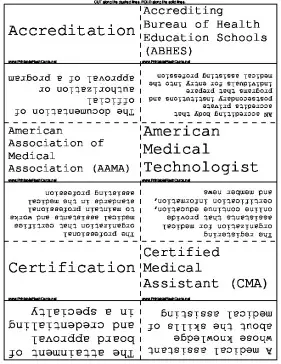

Those who are entering the medical field can use these printable flash cards to learn about the industry terminology.
There are 20 flash cards in this set (4 pages to print.)
To use:
1. Print out the cards.
2. Cut along the dashed lines.
3. Fold along the solid lines.
Sample flash cards in this set:




| Questions | Answers |
|---|---|
| Accreditation | The documentation of official authorization or approval of a program |
| Accrediting Bureau of Health Education Schools (ABHES) | AN accrediting body that accredits private postsecondary institutions and programs that prepare individuals for entry into the medical assisting profession |
| American Association of Medical Association (AAMA) | The professional organization that certifies medical assistants and works to maintain professional standards in the medical assisting profession |
| American Medical Technologist | The registering organization for medical assistants that provide online continue education, certification information, and member news |
| Certification | The attainment of board approval and credentialing in a specialty |
| Certified Medical Assistant (CMA) | A medical assistant whose knowledge about the skills of medical assisting |
| Clinical Laboratory Improvement Amendments of 1988 (CLIA '88) | A law enacted by Congress in 1988 that placed all laboratory facilities that conduct tests for diagnosing, preventing, or treating human disease or for assessing human health under federal regulations administered by HCFA and CDC |
| Commission or Accreditation of Allied Health Education Programs (CAAHEP) | A voluntary organization that accredits allied health education programs |
| Continuing education | Systematic professional learning experiences designed to augment knowledge and skills of healthcare professionals |
| Cross-training | The acquisition of training in variety of tasks and skills |
| Health Insurance Portability and Accountability Act (HIPAA) | A set of regulations whose goals include the following: (1)improving the portability and continuity of healthcare coverage in group and individual markets;(2)combating waste, fraud, and abuse in healthcare insurance and delivery;(3)promoting the use of medical savings account;(4) improving access to long-term are services and coverage; and (5)simplifying the administration of health insurance |
| Licensed practitioner | A healthcare provider who had obtained the necessary education and skills and is licensed to provide specific healthcare to patients |
| Multiskilled healthcare professional (MSHP) | A healthcare team member who has been cross-trained to handle many different duties |
| Occupational Safety and Health Administration (OSHA) | A federal organization that ensure safe and healthy working conditions for Americans by enforcing standards and providing workplace safety training |
| Patient navigator | A healthcare professional who helps patients find their way through the complex healthcare system, help them overcome any barriers they encounter to ensure that they get the diagnosis and treatment they need in a timely manner |
| Professional development | The skills and knowledge attained for both personal development and career advancement |
| Registered Medical Assistant (RMA) | A medical assistant who has met the educational requirements, took and passed the certification examination for medical assisting given by AMTs |
| Resume | A document summarizing one's employment and educational history |
| Scope of Practice | The procedures, processes, and actions a healthcare worker is allowed to perform under the terms of his/her professional license |
| Standard of Care | A legal term that refers to the care that would ordinarily be provided by an average, prudent healthcare provider in a given situation |